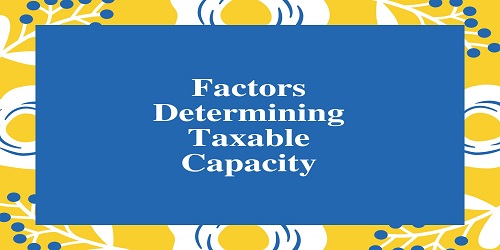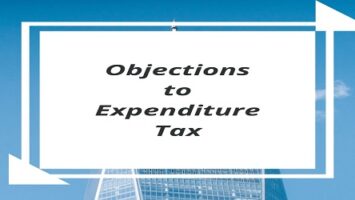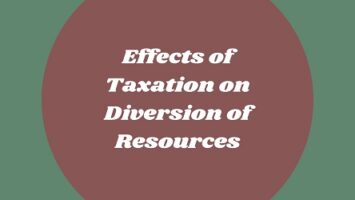Factors Determining Taxable Capacity:
(1) The Size of National Income- The taxable capacity of a country spends upon the size of national income. And the size of national income depends upon its natural resources and their proper utilization, the quality of labor and technological skill, and so on. The higher is the size of the national income of a country, the greater is the taxable capacity of that country.
(2) Size and Rate of Growth of Population- It is not only the national income of the country which determines its taxable capacity but it is also affected by the size and rate of growth of the population in that country. With a given volume of income of a country, the taxable capacity is indirectly proportional to the size of its population, i.e., the larger the population, the lower will be taxable capacity. Again, if the growth rate of national income is lower than that of the population, other things being the same, the per capita income will be reduced, and vice versa.
(3) The Distribution of Income and Wealth- The distribution of income and wealth also influence the taxable capacity of the people. Some economists believe that if wealth and income are unequally distributed, the taxable capacity will be high because it will be easy for the government to raise the bulk of its revenue from the richer section of the community. If the distribution of national income and wealth is equitable, the taxable capacity will be low. This is so because the ability to pay taxes on the part of the richer classes is much greater than that of not-so-rich people.
It should also be noted that if the distribution of income and wealth is more equitable, the government may not require to raise a huge amount of revenue, because no public expenditure is needed to remove inequalities.
(4) Pattern of Taxation- The taxable capacity also depends on the way in which taxes are raised. A well-thought-out mixture of taxation produces a larger sum than any one line of taxation is followed. It may, for example, be necessary to top increasing taxation in one direction, when it is felt to be exceedingly onerous and to launch out in another direction, such as heavier death duties. A tax on necessities of life or a tax on savings is not the same as a tax on drinks. Hence, the tax system should be broad-based.
(5) The Stability of Income- The taxation capacity is higher in those countries where income is stable. The income of the people is more stable in industrially developed countries than in agricultural countries. It should be noted that agriculture and industry both are interdependent, but agriculture is more easily influenced by some exogenous factors such as the failure of monsoon, which in turn affects the income of agriculturists and the revenues of the government.
(6) The Nature of Public Expenditure- The taxable capacity of a country is also influenced by the nature of public expenditure. If revenues, collected by way of taxation, are spent on the social and economic overheads or on the economic development of the people i.e., on the development of agriculture, industry, and trade, which increases income and production of the country, the taxable capacity will increase. But if most of the revenues, collected by way of taxation, are used on unproductive projects, the taxable capacity will not increase.
If the public expenditure is incurred for the payment of an external debt, this will reduce the net income of the paying country, because, a certain amount of the country’s production is exported without any return. Hence, it may reduce the taxable capacity of that country. On the other hand, if the money is applied to paying interest on internal debt or repaying internal debt, the taxable capacity will be greater, because taxes are returned to the citizens. It will increase the income and tax-paying capacity of the people.
(7) Psychology of the Tax-payers- The psychology of the tax-payers has much to do with the extent of taxable capacity. People are often willing to bear heavier taxation on patriotic or sentimental grounds. They may easily pay indirect taxes distributed over every day of a year than a direct tax levied in a lump sum once a year. Sentiment plays a considerable part in taxation as in politics. Oppression may raise men into heroes or sink them into slaves. Heavy taxation may make some men industrious, enterprising, and wealthy while others may become indolent, dispirited, and impoverished.
(8) Standard of Living of the People- The taxable capacity also depends upon the standard of living of the people. The standard of living depends upon consumption expenditure. The higher the consumption expenditure, the higher would be the standard of living. But, higher consumption is possible only by the high-income group. Hence, only the high-income group can have a higher standard of living. The people having a higher standard of living will have a higher capacity to pay taxes and vice versa. Prof. Kaldor is of the opinion that consumption expenditure is the best measure to determine the tax-paying ability of an individual.
(9) Administrative Efficiency- Taxable capacity is also influenced by the efficiency of administration. If tax collecting machinery is efficient and the tax obligations are uniformly enforced, tax evasion may be reduced. This may encourage them to pay their obligations. Taxable capacity may reduce because of unpopular policies and ineffective administrative machinery.
(10) Economic Situation- During the period of boom or the prosperity phase of the trade cycle, when manufacturers are making huge profits, the taxable capacity will be high. Contrary to this, during the period of depression, taxable capacity will be low, because of losses and low levels of income in the hands of the people.
(11) Political Conditions- Stable political conditions and successfully planned economic-development create confidence in the minds of tax-payers. They feel that what is taken out from their pockets has been properly utilized for the welfare of the community as a whole. This encourages the tax-payer to pay their obligations on time. If political conditions are unstable there is no planned development, and the rich are becoming richer and the poor is becoming poorer. This may shatter the faith of the tax-payer and community as a whole in the government, resulting in tax arrears, tax evasion, and general disorder in the country, and this may further lower the taxable capacity of the community as a whole.
To sum up, the taxable capacity of the community is ascertained with reference to the total surplus of production over the minimum consumption required to produce the volume of production. It is not an absolute amount or fixed figure but depends upon other things, i.e. the size of national income, the size and growth rate of the population, the distribution of wealth and income, the pattern of taxation, the nature of public expenditure, etc. It also depends on whether the revenue from taxation is spent inside or outside the country.









Comments (No)